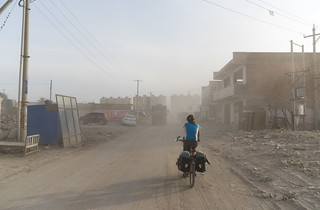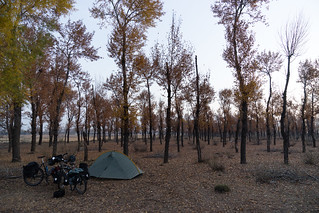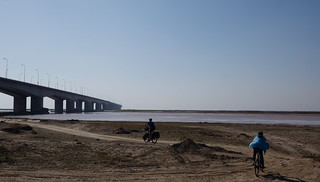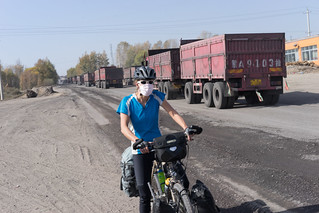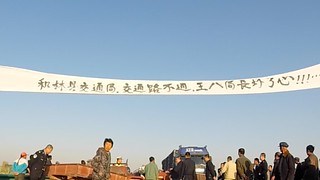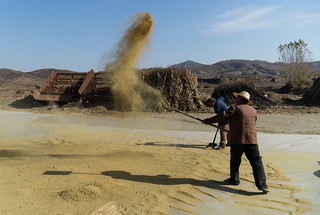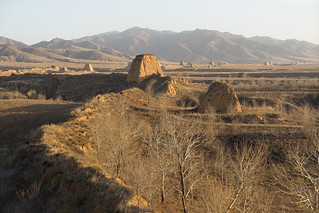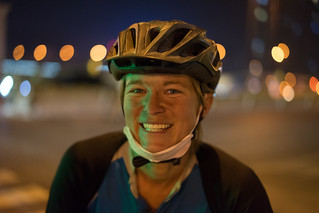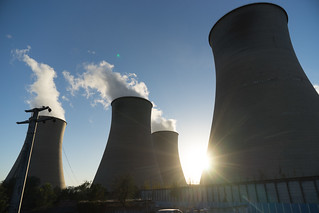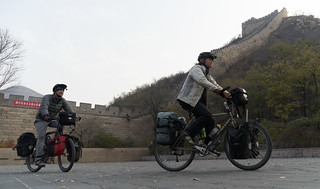About half of the world’s coal burned this year will be burned in China, and most of that coal is mined in the area north and west of Beijing. One reason that we decided to bike from Baotou to Beijing was that we wanted to ride through this coal-producing and burning region of the world. We expected this ride to be educational; we didn’t expect it to be scenic or fun.
Well, we were wrong. Yes, the coal trucks made for some horrible riding, and the last two days into Beijing were relatively unpleasant, but we were also surprised by the many excellent secondary roads, where fall colors arched over the roads and farmers harvested corn husks and other remains of the harvest. That said, we sometimes found ourselves on roads like this, on our way into Baotou.
We started in this city, which is on the Yellow River and which the Lonely Planet aptly describes as “booming but unlovely.” Goux Lee, a warm showers host, treated us like royalty. Goux owns a Trek bike shop, and when we arrived at his store he immediately set to work inspecting our bikes. A few hours later, Lindsey had new brakes and new brake levers, and both of our bikes had new chains. Perhaps most shockingly, Goux and his friends cleaned our bikes. It’s been months since I’ve seen some parts of del Fuego or Mini-Momem through the dirt and grime. I think both bikes were excited.
After fixing our steeds, Goux and his friends, almost none of whom spoke any English, took us out to a restaurant across the street. Soon we were eating a feast of Peking Duck and drinking good wine. One of his friends insisted we stay another day so that he could feed us the next night. We said we’d have to leave in the morning, but he could join us for breakfast. We then invited the six of them to join us on their bikes and ride out of town with us the next day.
They must have told their friends. In the morning, about 10 cyclists joined us for a breakfast of mutton dumplings. Another 10 joined after breakfast, making it 20 in total – on a Tuesday morning – biking out of town with us. Together, we rode out of Baotou, winding around unofficial waste-dumps and high-rises under construction to reach a newly-paved bike path along a levy following the Yellow River. For the next 20 kilometers we biked together. When it was time to part, we stopped and every cyclist took about 30 pictures of us with their smartphones.
All the cyclists except Goux and a friend of his returned to Baotou, and then the four of us continued along the levy. The paved road turned to well-packed dirt. We saw a few people with fishing lines in the water, even though a number of signs clearly indicated that you should not fish, drink, or even touch the water. I asked Goux if that was because it was too polluted. He said “yes,” and then said, in his limited English, “Food pollution, water pollution, air pollution, all big problems here.” I believed it — the air around Baotou had been think with dust from construction and smog. Also, I wondered how the water could be too polluted to touch, but not too polluted to irrigate the fields of corn in the river’s floodplain. We’ve heard that this is one way the food is contaminated, and that many farmers will not eat the food they grow for this reason.
Goux and his friend eventually turned back, and we continued on. We turned off the levy-road, only to encounter our first line of coal trucks. We crossed the Yellow River with a string of these trucks, and then turned onto a secondary road, free of such vehicles. The next few days would be like this: long sections on country roads, broken up with shorter sections on throughways for the lumbering transporters of carbon.
Our first night we found a campsite in some trees along a tributary of the Yellow River, and set up our tent. I thought this part of China would have too many people to camp; again, we were wrong. The only challenge is that in late October, the sun sets well before we want to stop biking. In some ways this is nice, as it provides an excuse to spend an hour or two in the tent reading (Books we’ve been reading: When a Billion Chinese Jump, Country Driving, The Geography of Thought, and Out of Mao’s Shadow.) – or, on this stretch of the journey, preparing for our many presentations scheduled in Beijing.
The second day we crossed the Yellow River again, and again we were joined by what seemed like an endless string of coal trucks. Lindsey put on a mask she had purchased in Baotou to protect her from the dust. I wore mine for about three seconds and found it uncomfortable. I assumed the pollution would get worse, and I’d wear a mask then. Anyway, tough guys don’t need pollution masks, right?
In the late afternoon, along a newly paved road, we soon found that traffic in our direction had stopped, and a line of parked coal trucks stretched to the horizon. We passed the trucks, and Lindsey started counting them. After passing 125, we arrived at the cause of the hold up. A small cart had been parked in the middle of the road, with rocks placed around its wheels, and a banner hung across the street. This was right next to a small village, and my immediate thought was that this was a protest by the people in the village. I was afraid to take out my camera, but I turned on my GoPro on the front of the bike, and was able to film the banner. On the far side, a small bus full of police officers came to a stop, and one of the police officers, perhaps only 20 years old, stuck his head out the window and stared at us. “Hello,” he said.
Lindsey tried to ask if it was an accident. He shook his head, but when she innocently asked what had happened, he seemed flustered and said “I cannot explain.” We don’t know if it was language or protocol that prevented the conversation from continuing. Then another, older, police officer, standing outside the vehicle, shook his head at us and waved us on. As we left, we saw people clearing rocks from the vehicle blocking the road to move the cart out of the way.
On the other side, Lindsey counted about 275 more trucks, making 400 in total waiting for the road to be cleared. One person we talked to said the cars had waited for only an hour or so, meaning that quite a few trucks had backed up in a very short time. A week later, in Beijing, we had someone translate the banner for us. It apparently says something like “Huilin transportation county office, the road is blocked, and the bureau chief has a black heart” — and “black heart” is actually some type of swear word. Our only guess is that people in the village were upset so many coal trucks were passing by their home. If I lived there, I’d also be upset by the noise and dust.
We found another great campsite, and the following day we enjoyed a 600 meter climb along a mostly-empty country road, and then another 60 kilometers on peaceful, well-paved country roads that wound through small villages. People were loading corn husks onto carts pulled by small motored tricycles or donkeys. And we watched people threshing beans, buckwheat, and millet. At one point we stopped and talked to a group of men and women piling up carrots after harvest.
As we’ve traveled in China, we’ve interviewed people about whether or not they think the climate has changed. We’ve been doing this by holding up a sheet with questions written out in Chinese, asking things like “Are winters warmer or colder than when you were a child? Does it rain more or less?” and so on. We interviewed the carrot farmers, and about one or two people a day for this entire stretch. Unfortunately, we have no idea what people said. We’re looking for help translating these conversations, and if you speak any Chinese, you can watch the videos here and help us out. We think that people are saying that it is getting warmer, but that it hasn’t really affected them very much… but we need better translation to be sure that is what people are saying.
That evening, as sunset approached, we tried to ask a few people in the towns we passed if we could camp. They all pointed us farther along the road. The small towns in this part of China have felt poorer than almost anywhere we’ve traveled. I think it’s because many of the houses are abandoned, and we’ve seen almost no young people. Most of the people harvesting corn or threshing grain appear to be well over the age of 40. It feels like the countryside is, for lack of a better word, dying. I think – and we’ve read – that all the young people have moved to the cities, where the jobs and the future of China seems to be.
The fourth day out from Baotou, we biked through many more of these small villages. In one of them, when we stopped at a small store, about 25 people, with nothing to do on a weekday morning, crowded around to stare at the cyclists. It was a different, less energetic interest than we saw in places like Uzbekistan, something that I attribute to Chinese being less extroverted, and the fact that the people in the countryside are, on average, much older than their counterparts in Central Asia. One of the old men came up to us and said “Hallelujah,” and then gave us a pen that appeared to have Bible verses written on it in Chinese. As we left town, we also saw a church — we’ve heard that Christianity has been growing quickly in China, and our friend was likely one of the converts.
We road to the north of Datong, by another huge power plant, and then, an hour before sunset, gained our first view of the Great Wall. From a distance, it appeared neither great nor wall-like, as all we saw were square, tapered mud towers rising up from harvested corn fields. As we approached, we saw a low mud wall connecting them. We stopped and tried to walk to the wall, and after 10 minutes of walking, we realized it was much bigger — and farther away — than we thought. It was, in fact, Great.
As dark approached, we tried to find a place to camp. We have a piece of paper with “can we camp here?” written in Chinese, and we showed this to some men along the road in a village where about half of the mud homes appeared to be disintegrating. They pointed to a spot right by the road, and we shook our heads. They eventually showed us a spot by what appeared to be an abandoned home. They stayed around and tried to communicate with us for a bit, I filmed them responding to our questions on climate change, and then they left.
This was the first time on this journey where we’ve asked for a place to camp and people have shown us a place to camp in their village instead of inviting us to camp next to their home or stay in it. We were fine with this, but it was surprising, in some ways. We guessed we had been spoiled by the extreme, guerrilla hospitality practiced in the Muslim countries of Central Asia.
It was also very surprising when, an hour later, as we read in our sleeping bags, footsteps approached our tent and suddenly our tent door was unzipped. An older man stuck his head into the tent and started talking loudly. Our terror quickly turned to amusement, as he seemed to be concerned that we were cold and hungry, and we think he might have been inviting us to his house. However, we had already eaten, and he smelled of alcohol. I filmed a bit of him sticking his head into our tent. After he left, I looked out of the tent and noticed that the town was entirely dark. Even though this part of the world is burning more coal than anywhere else, producing incredible amounts of electricity, this town was either not connected to the grid or too poor to turn the lights on.
We left camp well before dawn and spent the sunrise climbing on a stretch of the Great Wall. We read that bricks once covered the mud towers and connecting walls, but now it is just the mud interiors, with trees growing out of parts of it. A section had been cleared for the road, which made passage from Inner Mongolia to the rest of China far easier than it was hundreds of years ago. We stood atop a watchtower on the abandoned wall and watched the sun rise over the horizon.
What proceeded turned out to be our longest day of the trip so far — 165 km, or 102 miles. With a gradual downhill, strong tailwind, and great pavement (except for one 10km stretch of dirt), we pedaled quickly toward Zhangjiakou, a town where we had a warmshowers.org host. The Great Wall paralleled us far to our left, and then climbed over the mountains as we progressed during the day. We passed through many more small villages, some surrounded by mud walls that appeared to be a similar vintage to the Great Wall. The last 20 kilometers of the day were some of the least pleasant of the trip, as we entered the city by passing through its industrial corridor, and so much dust was in the air that our skin changed color. We eventually reached downtown Zhangjiakou in the dark, where we were met by modern highrise buildings (after passing many empty new buildings on the city’s outskirts) and bridges decorated by multicolored lights.
In Zhangjiakou, we stayed with Yang Yijun, a warm showers host who goes by the name of “Yankee.” Yankee took us out to another delicious meal of dumplings, and shared with us what his life was like. He worked at the local coal power plant as an engineer. He told us that the town had become much cleaner and better in the past 10 years, and that he would also “never” enter town by the industrial route we had followed. Yankee had planned to take a vacation and go for a bike tour in the U.S., but ironically, the U.S. embassy rejected his application, so now he’s hoping to do a tour in Europe. We also talked about whether it would be possible to leave his job and take a long vacation like we were doing. He said that doing so in a small city was extremely difficult — he had a good job, and it is unusual for people to leave their jobs, for any reason (other than promotion within the same company). Doing so could appear strange to potential future employers, so he felt he needed to stay with his company. We feel extremely lucky to be able to take this journey, and that a varied career path is fairly accepted in the US, at least in our field. So many people, who have the necessary finances to travel the world (it is cheap), don’t feel like they can leave their jobs, can’t get the visas, or are otherwise unable to do so.
We talked with Yankee about climate change, and he said that he thinks that both summers and winters are warmer than they used to be. He also said that his wife wanted to get a car, but that he didn’t want to because of the pollution. Here is Yankee responding to our questions.
The next day, Yankee wanted us to stay, visit a stretch of the Great Wall near Zhangjiakou, and go for a bike ride with his friends, but unfortunately we didn’t have time. After lunch with him and his son (his only child), we biked out of town, passing by another coal fire power plant.
During this week, we passed many, many power plants, all of which (I’m fairly sure) burned coal. Most looked new, though a few appeared to have been there for decades. One reason we saw so many plants is that we followed rivers, and power plants, because they need steam to drive their turbines, need a water source. I wanted to see where the rest of China’s power plants are, so I downloaded a freely available database of power plants from carma.org and added China’s power plants to our trip’s interactive map — just click on “see power plants” above the map on the right. This database is definitely missing some power plants — I saw new ones that were not on the map. Nonetheless, I think it gives a good view of where the power plants in China are. On the map, you can scale the power plants either by how much carbon they produce, or how much energy they produce (as of 2009).
When we see these power plants, I feel a strange combination of awe, hope, and sadness. The scale and number of these energy factories is impressive, and it is exciting to think of how hundreds of millions of people in China now have electricity who did not have it a few decades ago. Yet there, on the coal trucks and in the smoke stacks, is the reason that we are on a trajectory to warm the planet by three or four degrees Celsius this century. In some ways, they are tombstones for our future climate — huge monuments to our failure to curb emissions.
From Zhangjiakou, we had only a day and a half until we reached Beijing, which we had heard “is its own universe, with rings the size of Jupiter.” We left Zhangjiakou in the afternoon, got a hotel that night, and then rode a long 120km day. The first 90 kilometers were along busy roads lined with factories. Very few private vehicles passed us — they were almost all trucks.
For the final miles of the day, we followed back roads, riding along the edge of a reservoir and climbing into the hills surrounding Beijing. Then, as the sun set, we gained a view of the Great Wall snaking over the mountaintops. We rode to the wall’s edge and then followed a dirt trail until we found a spot to set up our tent at the foot of the wall.
Before dawn the next day, we hiked up to the wall and were greeted by an exciting sight: a makeshift ladder that could take us to the top. This section of the Great Wall, near Beijing, had been restored in the ‘50s and ‘80s. It felt less authentic than what we had seen a few days earlier, but it was still beautiful. We were also the only people on the wall for as far as we could see, and we watched the sun rise over the hills to the east.
We returned to the bikes, did an obligatory Great Wall photo-shoot, and then biked downhill to Beijing.
Entering the city was far easier than we had expected, largely because many of the major roads have significant bike lanes, and because the city spreads out over a a massive area.
We biked to the home of Duncan, a warm showers host from the U.K. teaching at a boarding school, and enjoyed beers and stories of bike touring. After eight days of riding, we were ready for a few days off the bike.







